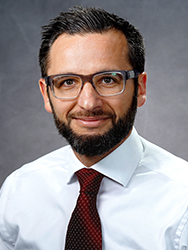
Jeffrey J Tomaszewski, MD
This week, New Jersey Governor Phil Murphy disclosed that he will be undergoing surgery for a tumor on his kidney: “Gov. Phil Murphy has tumor on kidney, likely cancer, via NJ.com.“ We reached out to Jeffrey J. Tomaszewski, MD, Cooper surgical oncologist, for his insights on kidney cancer. He shared the following:
“In 2019, kidney cancer was the 8th most common tumor type among women in the U.S., affecting an estimated 29,700 women and 44,120 men. One in 47 men and one in 82 women, respectively, will be diagnosed with invasive kidney cancer in their lifetime. Thankfully, many patients with kidney cancer will survive following their treatment. Five years following diagnosis, 93% of patients with localized kidney cancer will still be alive, while 75% of those with spread outside the kidney will survive. Compared to other cancer types, the survival rates for kidney cancer are actually quite good! Risk factors for kidney cancer include tobacco exposure, high blood pressure, obesity, and a family history of kidney cancer. That said, the majority of tumors occur spontaneously in those with an absence of risk factors. Most patients with kidney cancer do not have symptoms at the time of presentation, and we do not routinely screen for kidney cancer. Symptoms can occur with more advanced disease, and include flank pain, blood in the urine, unexplained weight loss, and bone pain. Typically, most kidney tumors are detected incidentally when people undergo imaging tests for other purposes, as was the case for Governor Murphy. For most patients diagnosed with kidney cancer, surgery is the mainstay of treatment, and can be curative in most. For patients with cancer spread outside of the kidney, treatment typically includes whole-body targeted care and immunotherapy. Thankfully, most patients with kidney cancer can be cured.
Our surgical treatments for kidney cancer have improved drastically over the past decade, and with the use of minimally invasive and robotic surgical techniques, kidney preserving procedures can be performed in most patients, oftentimes using just a single skin incision. Many patients are able to return home within one day following surgery, and return to work within a few weeks. Further, at advanced centers like MD Anderson Cancer Center at Cooper, the use of novel 3D printed kidney models is being employed to further facilitate our ability to preserve kidney function while still achieving complete tumor removal. In patients with highly complex tumor anatomy, surgery can be “rehearsed” on a 3D printed model, thereby optimizing kidney preservation efforts. For any patient diagnosed with kidney cancer, a multidisciplinary approach to management involving surgeons, oncologists, and radiation oncologists should be employed to maximize treatment efficacy and minimize side effects.”
Jeffrey J Tomaszewski, MD is a urologic oncologist and the Director of the Genitourinary Oncology Program at MD Anderson Cancer Center at Cooper.
